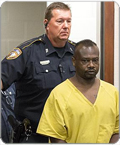
Last week’s Texas shooting was a tragic event that has once again rattled the United States to look at their regulations once again. A Texas women, Valerie Jackson, was killed along with her husband and six children in their own home is Houston. The shooter was the women’s former domestic partner, David Ray Conley.
Conley was able to purchase the gun used in the shooting online, which he then used in the mass killing. The woman’s children included her 13-year old son who she had had with Conley when they were together. When the couple were together, Jackson was the victim of domestic violence at the hands of her ex-partner. In the early 2000s, records show that Jackson had reported to police that Conley had cut her in the neck and abused her while also wrapping an electrical cord around their child’s neck.
Conley’s prior convictions should have qualified him for a maximum of 25 years but instead he only served 5 years in prison due to a plea deal with the defense. Upon release Conley still continued to harass his ex partner until the day came when he finally committed the gruesome crime. Many have been blaming the lax regulations and loopholes that exist around background checks and online firearm sales. According to Everytown for Gun Safety, one in thirty people who have bought guns online shouldn’t even be allowed to own the guns because of their criminal records.
“Anybody can go online and arrange to purchase a gun from an unlicensed seller. Criminals and other people know that they can do this and skip the background check requirement that they would have to go through in a store,” Erika Soto Lamb, Communications Director for Everytown for Gun Safety.
Jackson’s death was the ninth in Texas since 2009 involving domestic violence. The presence of a gun in a domestic violence situation increases the likelihood that the women will be killed by 500 percent; in states that require background checks on all handgun sales, 46 percent fewer women are killed.
According to the FBI, a mass shooting is defined by any time where four or more people are killed. According to this definition, Soto Lamb says, the majority of mass shootings are actually domestic violence related. “Movie theaters and churches get more news coverage – but mass shootings are happening all the time across the country…but they’re happening in people’s homes. Women are getting killed, children are getting killed.”
She notes that in the past year, a half a dozen states have passed laws preventing domestic violence offenders from passing a background check, while another half a dozen states have created states laws to close the loophole regarding online sales and requiring a background check on all gun sales.

